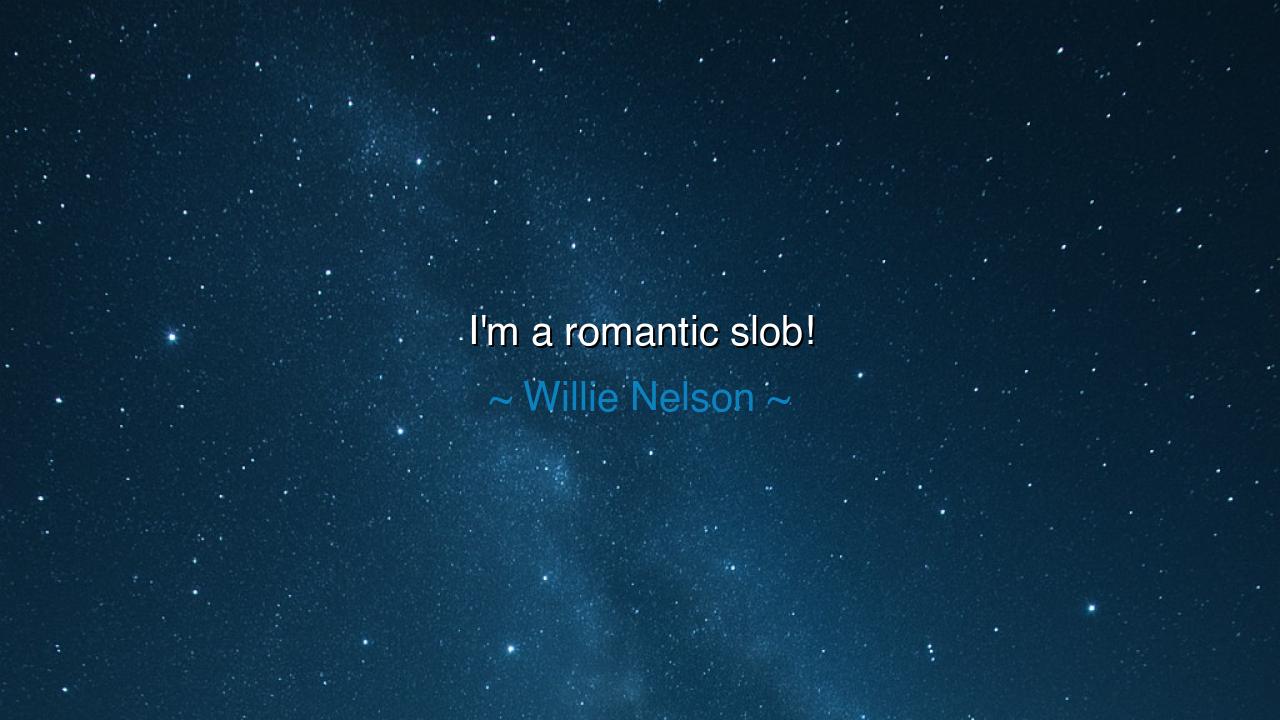
I'm a romantic slob!






"I'm a romantic slob!" — these words from Willie Nelson ring with a delightful contradiction, a blend of romance and imperfect human nature. It is a phrase that captures the essence of an artist who, while embracing the grandeur of love and passion, also acknowledges the flaws and messiness of human experience. To call oneself a "romantic slob" is to celebrate the contradictions of life — the beautiful chaos of emotions, the unpolished nature of love, and the vulnerability of allowing oneself to be swept up in something that cannot always be controlled or neatly arranged.
In the ancient world, romantic love was often seen as both a force of great beauty and great turbulence. Plato, in his Symposium, spoke of Eros—the god of love—as a powerful and uncontrollable force that could elevate the soul or plunge it into chaos. Socrates himself, in his dialogues, argued that the pursuit of love, while lofty and noble, was also a path fraught with human limitations. To be a romantic, he would suggest, is to expose oneself to both the sublime and the messy sides of life. In this sense, Willie Nelson’s self-description as a romantic slob echoes the ancient understanding that love, in all its beauty, comes with its own disorder and imperfections.
Yet, there is something profoundly humbling and human about the term "romantic slob." The ancient epic poets like Homer, though they extolled the nobility of love in their tales, also showed us that love’s heroes, from Odysseus to Paris, were flawed beings. Achilles wept over his lost friend Patroclus, and Helen of Troy was caught in the chaos of love’s consequences. Love’s messy nature is not just a romantic notion; it is an essential part of the human condition. Nelson, in his own way, reflects this understanding — to be a romantic slob is to fully embrace the complexity of human emotion, the yearning and the imperfections that come with loving deeply.
Nelson’s statement can also be seen as a declaration of honesty in an era where many strive to portray themselves as something they are not. In ancient Roman society, the idea of virtus — a concept of public virtue and personal excellence — was deeply ingrained. But even the greatest Roman figures, such as Julius Caesar or Cicero, were not immune to failure, mistakes, and emotional turmoil. Just as these leaders, while powerful, were also vulnerable, Nelson’s words reflect an acceptance of the messy and real aspects of our personal journeys. To be upfront about one’s imperfections is not weakness but strength, an embracing of one’s true nature without fear of judgment.
Consider, too, the legendary poets of ancient Greece, who often wrote of love with both passion and grief. Sappho, whose love poems to women have survived the ages, captured the turbulent nature of love in her verses. The Greeks knew that love could not be captured by a perfect, tidy formula—it was, instead, a chaotic, overwhelming force that could leave even the most mighty of individuals feeling helpless. Willie Nelson’s words, in a modern context, can be seen as a tribute to this same timeless truth. To be a romantic slob is to acknowledge the sacrifices love asks of us and the messiness that often comes with it. It is to live boldly in the face of uncertainty, to love despite the unknowns and the imperfections of those involved.
Through his declaration, Willie Nelson speaks to a profound truth about the human experience: that true love cannot be reduced to neat, manageable packages. It is a force that runs wild, uncontainable by societal norms or personal control. Romanticism, in its purest form, embraces the messy, chaotic, unpredictable nature of life. Whether it is the deep connection felt between friends, the unspoken bond between parent and child, or the passionate love affair that defies reason, all are parts of the romantic slob that each of us contains within. It is in the very flaws and imperfections of these relationships that their true beauty lies.
What lesson can we draw from Willie Nelson's "romantic slob" philosophy? It is this: to love fully, we must embrace the mess. Perfection is not the goal; honesty and authenticity are what truly matter. In a world that often demands polished appearances and controlled emotions, the romantic slob dares to be real, unfiltered, and vulnerable. To be human is to love and to stumble; to be a romantic slob is to accept that imperfection is a natural part of the beautiful, painful, and transformative act of loving. The lesson here is clear: Let go of the expectation of perfection and allow the truth of your feelings to take shape in their rawest form. Only in this embrace of reality can we experience love in its fullest, most authentic expression.






AAdministratorAdministrator
Welcome, honored guests. Please leave a comment, we will respond soon